(Magazine) Yojana Magazine: Issue April 2011
Yojana Magazine: Issue April 2011
It took us the horror of two world wars to realize and accept that peace and freedom in the true sense can be achieved only if we respect the inherent dignity of every individual and are committed to establishing social, political and economic orders that are fair and just for all. The Universal Declaration of Human Rights may not be legally binding on nations, but as part of the customary international law, it does affect the national conscience and subject moral pressure on countries to work towards securing rights and justice for their people.
For a country like India whose commitment to this objective is amply visible in its Constitutional provisions, the actual attainment of the end is certainly not easy. To start with, probably no other country in the world has to reckon with as many potentially divisive, diverse forces as ours. There are differences of region, religion, sex, caste and language. There are differences in economic status and educational attainment. Then there are people with physical and age related disabilities, those rendered homeless due to internal conflicts, natural disasters, industrialization and such other reasons, whose rights need to be protected. Economic development and rapid urbanization have contributed their own sets of vulnerable population groups – the migrants, the slum dwellers, the industrial labourers, and those affected by deterioration of environment. So when India talks of securing human rights and social justice for all, she is not talking about a small, manageable, largely homogenous population . She is actually talking about securing the rights of more than a billion people, immensely heterogeneous in their diversity and often having interests that appear to be in direct conflict with those of another group.
India’s report card in this area is typically that of a student who has made significant achievement, but still has a lot more ground to cover. So, while our women today are definitely on a steady path to empowerment, a lot many of our children are still deprived of even basic education, and are forced into employment. Our mechanisms and institutions for providing long term, sustainable care to the elderly and the disabled are still very sketchy. While the government is taking rapid strides in the area of ensuring inclusive growth, caste and region based differences still exist in the common psyche.
Read MoreCourtesy: Yojana.gov.in



Comments
yojana magazine
how do i download yojana magazine